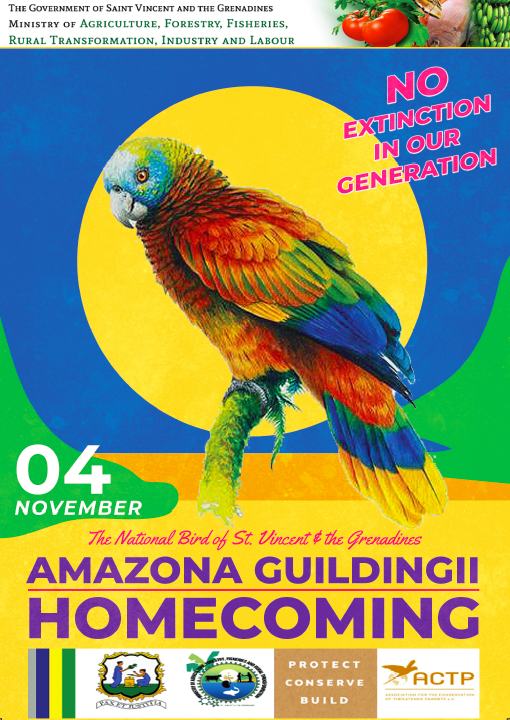St. Vincent and the Grenadines: Mother Nature’s Paradise
SVG continues to lead in the vanguard of conservation in the region

St. Vincent and the Grenadines, in cooperation with the Association for the Conservation of Threatened Parrots (ACTP), will celebrate the repatriation of the first of three parrots bred on an off-island conservation site this Monday, November 4!
It is the first time in the history of the island that Amazona Guildingii parrots bred ex situ would be returned to St. Vincent and the Grenadines.
Conservation efforts such as this are becoming increasingly important given the vulnerability of Caribbean islands to natural disasters such as hurricanes, and in some cases volcanic eruptions, which can mean the overnight destruction of rich biodiversity.
The Government of St. Vincent and the Grenadines has a long standing relationship with the ACTP to protect its national bird. The Association engages in the protection of the Amazona Guildingii through in situ (on island) conservation measures and a joint breeding program at their state-of-the-art parrot breeding centre in Germany.
Minister of Agriculture in Saint Vincent and the Grenadines, Hon. Saboto Caesar noted,
“The historic event of the return of the parrots [on November 4] will signal a new dispensation in our nation’s conservation efforts.”
Minister Caesar added,
“We protect our turtles and the Union Island Gecko. A Parrot Fish assessment is being done and we have a ban on all glyphosate usage and aerial spraying.”
“SVG is Mother Nature’s Paradise. Let us protect our blessed nation and there is no better time for us to renew our efforts than as we participate in 12 months of celebration of our national independence – Renewal at 40.”

The ACTP also has a history of working with other OECS countries such as Saint Lucia and the Commonwealth of Dominica; and Brazil in the wider Latin America and the Caribbean region.
In an interview, President of the ACTP Martin Guth stated,
“The world is always a better place when conservationists work harder to bring about positive changes.”

About the Amazona Guildingii:
The Amazona Guildingii, endemic to the island of St. Vincent and the Grenadines, is one of the rarest and most magnificent parrot species on earth. The limited size of its home island, human impacts on the habitat and natural disasters have steadily reduced population numbers, since humans colonised the islands around 10,000 years ago.
About the Association for the Conservation of Threatened Parrots:
The Association for the Conservation of Threatened Parrots (ACTP) is a non-profit based in Germany, founded in 2006 by Martin Guth. ACTP’s goal is to preserve threatened parrot species and their habitats.
ACTP’s protection of species is always based on two main pillars: The work in the parrots natural (in-situ), on one hand, and the breeding of the species outside their original habitat (ex-situ) on the other. This always in close cooperation with the governments of the countries of origin.
Home – Ministry of Agriculture, Forestry, Fisheries and Rural Transformation
The Biodiversity and Ecosystems Management Programme
From: OECS Communications Unit





